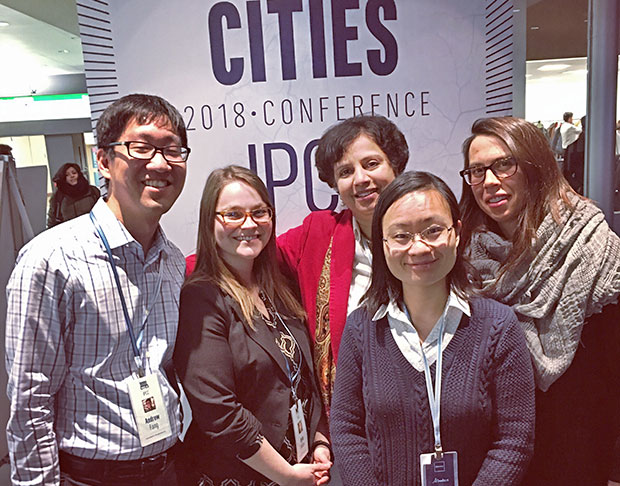Humphrey School’s Anu Ramaswami Presents High-Profile UN Reports at Climate Change Conference

Leaders around the world need to take up the challenge of redesigning urban areas to make them cleaner, healthier, and sustainable for the planet’s growing population, according to climate change experts who attended an international conference on sustainable cities March 4-7 in Edmonton, Alberta.
During the conference, Professor Anu Ramaswami, a leading scholar on sustainable urban systems at the University of Minnesota's Humphrey School of Public Affairs, presented two high-profile United Nations Environment reports that she helped research and write. They both lay out new strategies to meet the challenge of 21st century urbanization.
Three Humphrey School PhD students and a post-doctoral associate were also selected to present at the conference, which was co-sponsored by the Intergovernmental Panel on Climate Change (IPCC). More than 750 scientists, policymakers, researchers, and development experts from around the world attended. It’s the first time the IPCC has hosted a high-level scientific conference specifically about cities.
The UN’s reports look at the issue of sustainable cities from different perspectives. One focuses on the global impact, while the other focuses on Southeast Asian countries including Indonesia, the Philippines, Thailand, Myanmar, Malaysia, Vietnam, and others.
Both reports call for fundamentally new approaches to the way cities are designed, so that people can live in functionally and socially mixed neighborhoods with better mobility options, including public transportation, walking, and cycling. Cities should also work to provide more energy-efficient heating, cooling, and lighting, and more resource-efficient components such as vehicles, infrastructure, buildings, and factories, the reports recommend.
Ramaswami, the principal author of the Southeast Asia report, notes that the region has one of the fastest growing rates of urbanization in the world, but it can’t meet the current demand for basic services such as clean water, electricity, and clean cooking fuel.
“This is a challenge for leaders in Southeast Asian countries, but it also creates a historic opportunity to plan and build infrastructure that lays the foundation for sustainable urbanization in the region,” the report states.
PhD students in the Humphrey School’s Science, Technology, and Environmental Policy area Dana Boyer, Andrew Fang, and KK Tong, and Institute on the Environment post-doctoral associate Rylie Pelton, presented their research at the conference.
The goal of the conference was to assess the state of current research and knowledge related to cities and climate change, and to establish a global research agenda for addressing those knowledge gaps.
“I was extremely inspired by the discussions about research and knowledge gaps,” says Tong. “The cutting-edge research that we are doing in our STEP urban sustainability group at the Humphrey School either fills or aims to fill some of these knowledge gaps. As a junior scientist on urban sustainability, nothing is more inspired than this.”
Ramaswami is the Charles M. Denny Jr. Chair of Science, Technology, and Environmental Policy (STEP) at the Humphrey School.

